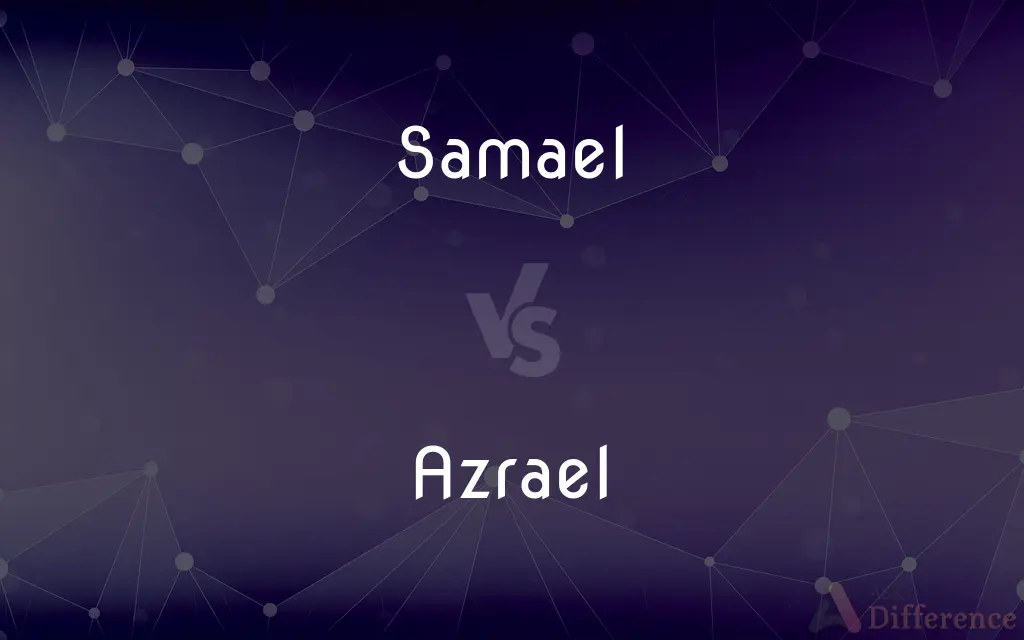Samael vs. Azrael — What's the Difference?
Edited by Tayyaba Rehman — By Urooj Arif — Updated on February 28, 2024
Samael is often associated with death and destruction in Jewish lore, while Azrael is known as the Angel of Death in Islamic tradition, tasked with parting the soul from the body.

Difference Between Samael and Azrael
Table of Contents
ADVERTISEMENT
Key Differences
Samael, in Jewish mysticism, is a complex figure often associated with both good and evil. He is sometimes seen as an angel of death, a destroyer, and a prosecutor who challenges human beings and reports their sins. Azrael, conversely, holds a more straightforward role in Islamic tradition as the Angel of Death, a compassionate figure who gently separates souls from their bodies, guiding them to the afterlife.
Samael's role and nature vary across different texts, being depicted at times as adversarial and at others as an instrument of God's will, Azrael's character is consistently seen as fulfilling a sacred duty without personal animosity or pleasure. Azrael's actions are depicted as acts of mercy, helping souls transition to what lies beyond.
The name Samael is not universally recognized across all branches of Judaism and is more prevalent in Kabbalistic texts, where he embodies the necessary evil that exists in God's creation. Azrael's name, while not explicitly mentioned in the Quran, is widely accepted in Islamic tradition and folklore, signifying the inevitability and impartiality of death.
Samael's portrayal often includes elements of temptation and opposition, suggesting his role in testing the faith of humans, similar to but distinct from the Christian concept of Satan. Azrael, by contrast, is depicted without such moral ambiguity, serving a divine function that underscores the compassion and justice of God's judgment.
Both figures, despite their roles associated with death, serve to highlight the balance between life and death, good and evil, within their respective religious frameworks, offering insights into how different cultures understand and personify the concept of death.
ADVERTISEMENT
Comparison Chart
Tradition
Jewish
Islamic
Role
Angel of death, destruction, and temptation
Angel of Death, soul separator
Perception
Ambiguous, both good and evil
Compassionate, fulfilling God's will
Symbolism
Temptation, opposition, necessary evil
Mercy, inevitability of death
Textual References
Kabbalistic texts, Jewish mysticism
Islamic tradition and folklore
Compare with Definitions
Samael
An angel associated with death and destruction in Jewish lore.
Samael is often depicted as a prosecutor in heavenly courts.
Azrael
The Angel of Death in Islamic tradition, who separates souls from bodies.
Azrael gently guides the souls of the deceased.
Samael
Known for challenging humans and tempting them away from God's path.
Samael tested Job's faith in God's justice.
Azrael
Seen as a respectful and dignified figure.
Azrael honors the dead and respects the living in his duties.
Samael
Represents necessary evil in creation.
Samael's existence is justified within the balance of good and evil.
Azrael
His presence is a reminder of the inevitability of death.
Azrael's role underscores the certainty of life's end for all.
Samael
His role varies across different Jewish texts.
In Kabbalistic writings, Samael is a complex figure embodying both opposition and divine will.
Azrael
Not mentioned by name in the Quran but recognized in folklore.
Azrael is tasked with taking the soul of every creature by God's command.
Samael
Sometimes equated with the Christian Satan.
Samael is considered a chief adversary in some texts.
Azrael
Acts out of compassion and duty, without personal animosity.
Azrael's actions reflect the mercy and justice of God.
Samael
Samael (Hebrew: סַמָּאֵל, Sammāʾēl, 'Venom of God, Poison of God' or 'Blindness of God, Left Hand of God'; Arabic: سمسمائيل, Samsama'il or سمائل, Samail; alternatively Smal, Smil, Samil, or Samiel) is an archangel in Talmudic and post-Talmudic lore; a figure who is the accuser (Ha-Satan), seducer, and destroyer (Mashhit). Although many of his functions resemble the Christian notion of Satan, to the point of being sometimes identified as a fallen angel,: 257–60 in others he is not necessarily evil, since his functions are also regarded as resulting in good, such as destroying sinners.He is considered in Talmudic texts to be a member of the heavenly host with often grim and destructive duties.
Azrael
Azrael (; Hebrew: עֲזַרְאֵל, romanized: ʿǍzarʾēl; Arabic: عزرائيل, romanized: ʿAzrāʾīl or ʿEzrāʾīl) is the angel of death in some Abrahamic religions, namely Islam and some traditions of Judaism. He is also referenced in Sikhism.Relative to similar concepts of such beings, Azrael holds a rather benevolent role as God's angel of death; he acts as a psychopomp, responsible for transporting the souls of the deceased after their death.
Common Curiosities
What is Azrael known for?
Azrael is known as the Angel of Death in Islamic tradition, responsible for separating the souls from the bodies.
Is Samael considered evil?
Samael's nature is ambiguous; he embodies aspects of both good and evil, serving as a necessary part of God's creation.
Are Samael and Azrael the same being?
No, they are distinct beings within their respective religious traditions, with different roles and attributes.
What is the significance of Azrael in Islam?
Azrael's role as the Angel of Death emphasizes the mercy and justice of God, and the inevitability and impartiality of death.
Is the name Azrael mentioned in the Quran?
Azrael's name is not mentioned in the Quran but is widely recognized in Islamic tradition and folklore.
Does Samael play a role similar to Satan?
In some texts, Samael's role and characteristics are similar to those of Satan, but they are not always equated.
Can Samael be seen as a positive figure?
In certain contexts, Samael is seen as fulfilling a necessary function within the divine order, making his role complex rather than wholly negative.
Do Samael and Azrael work together?
There is no traditional narrative that depicts Samael and Azrael working together, as they belong to separate religious traditions.
What lessons can be learned from the stories of Samael and Azrael?
Their stories highlight the balance between life and death, good and evil, and the diverse ways cultures personify and understand death.
How does Azrael carry out his duties?
Azrael carries out his duties with compassion, gently guiding souls to the afterlife without causing unnecessary pain.
Who is Samael?
Samael is an angel associated with death and destruction in Jewish mysticism, embodying both adversarial and divine roles.
How do people view Azrael's arrival?
In Islamic tradition, Azrael's arrival is seen as a natural and inevitable part of life, met with respect and acceptance.
Why is Azrael sometimes depicted with a gentle demeanor?
Azrael's gentle demeanor reflects his role in easing the transition of the soul from the earthly realm to the afterlife, embodying God's mercy.
How do Samael and Azrael differ in their interaction with humans?
Samael interacts with humans by testing and tempting them, while Azrael's interaction is marked by the compassionate fulfillment of his duty at the end of their earthly lives.
What does Samael symbolize in Jewish mysticism?
Samael symbolizes the existence of opposition and temptation within God's creation, serving as a test to human faith.
Share Your Discovery

Previous Comparison
Peso vs. Centavo
Next Comparison
Bullshit vs. CrapAuthor Spotlight
Written by
Urooj ArifUrooj is a skilled content writer at Ask Difference, known for her exceptional ability to simplify complex topics into engaging and informative content. With a passion for research and a flair for clear, concise writing, she consistently delivers articles that resonate with our diverse audience.
Edited by
Tayyaba RehmanTayyaba Rehman is a distinguished writer, currently serving as a primary contributor to askdifference.com. As a researcher in semantics and etymology, Tayyaba's passion for the complexity of languages and their distinctions has found a perfect home on the platform. Tayyaba delves into the intricacies of language, distinguishing between commonly confused words and phrases, thereby providing clarity for readers worldwide.
















































